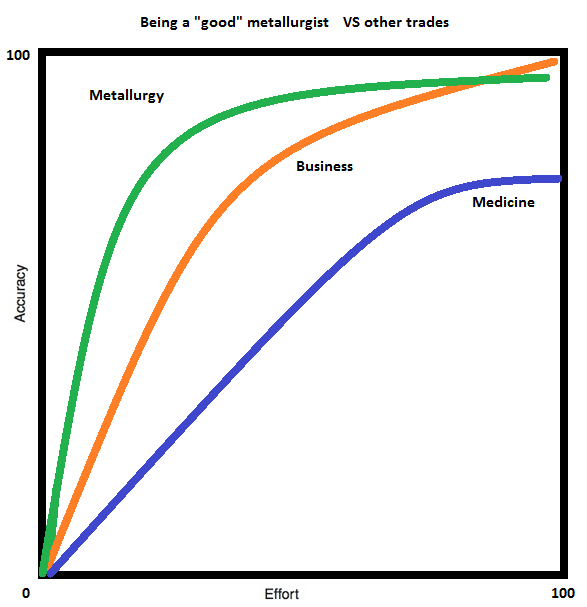YES! Become a Great METALLURGIST
Going from “Being”, to Good, to GREAT!
Some say it is a matter of doing certain things.
Others say it is a matter of doing things in a certain way.
Here a very detailed list of specific skills under the heading “Mineral Processing Basics” that can be further categorised into the following groups:
- Knowledge of specific processes (flotation, grinding),
- Understanding of basic mineralogy,
- Skills in collecting metallurgical data (surveys, equipment specs, ore characterisation),
- Skills in handling numerical data,
- Understanding of experimental method, precision, accuracy and error,
- Process modelling skills,
- Financial modelling skills,
- Skills in problem solving, and
- Writing clear and concise technical reports on which operational and management decisions will be made.
Here is a list of core technical capabilities required by graduates includes (Munro 1990):
- Size By Size Mineral Particle Behaviour,
- Mass Balances,
- Chemistry of the Process,
- Laboratory and Pilot Plant Techniques,
- Unit Operations and Processes,
- Process Dynamics and Control, and
- Experimental Technique.
A list of technical reading was also recommended as follows:
- “Engineering & Mining Journal” – monthly,
- “Mining Engineering” – monthly,
- “Mining Magazine” – monthly,
- Proceedings of Australasian Institute of Mining & Metallurgy – quarterly,
- “Canadian Mining & Metallurgical Bulletin” – monthly,
- Proceedings of Institution of Mining & Metallurgy (London): Section C “Mineral Processing“
- and Extractive Metallurgy” ‐ ~ quarterly,
- “Journal of the South African Institute of Mining & Metallurgy”,
- “International Journal of Minerals Processing” – quarterly,
- “Minerals And Metallurgical Processing” – quarterly, and
- “Minerals Engineering” – quarterly
A “Metallurgist“Mineral Processing Engineer need these Specific attributes:
- In‐depth knowledge of the field of study,
- Effective communication,
- Independence and creativity,
- Critical judgement, and
- Ethical and social understanding.
The amount of effort required to achieve ever greater mastery, whether it be a skill, sport, intellectual endeavour, or life itself, seems to follow an exponential (power) curve. At first, great progress can be made with little increase in perceived effort. Each step forward seems to require a similar amount of effort as the previous step. That is until we start to become good.
With each step from good to great, it starts to take a perceivably greater amount of effort (and time). And this is where most stop. The increase in level of mastery becomes almost imperceptible, even though we seem to be applying the same amount of effort as we had done in the past. Frustration sets in and suddenly it’s time to find something new to master.
For those few that stick with it, over time, and with ever-increasing levels of effort, they can go from good to great. And fewer still, from great to outstanding. Yet, the interesting thing is, that to go from outstanding to being truly legendary is nigh on impossible if you simply try to apply greater levels of effort. There’s just not enough hours in the day or years in a lifetime. No, sometimes the way forward is less about doing and more about being…now there’s a thought.
How “Hard” is it to be a Good Metallurgist
 As for myself, I still a long ways to go. Am not sure am good or … evil… Actually, if Google is right, I must be evil.
As for myself, I still a long ways to go. Am not sure am good or … evil… Actually, if Google is right, I must be evil.

Professional Development for Metallurgists – Improving Technical Skills by D Drinkwater, D Bradshaw, P Tilyard and P Munro
In about 10 yrs, young “Competent” Engineers will understand this parody.

